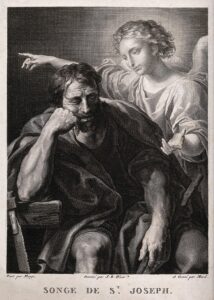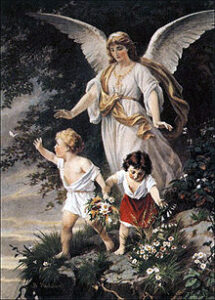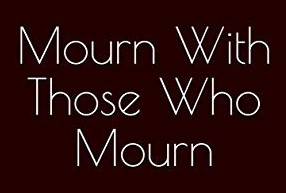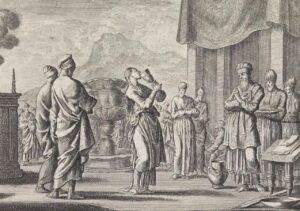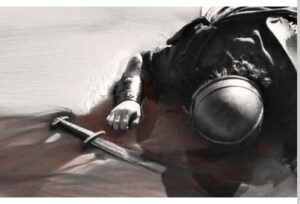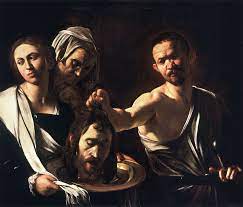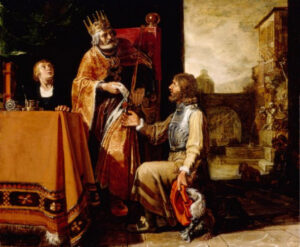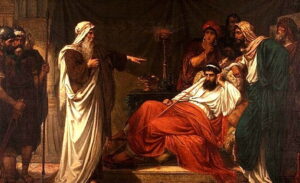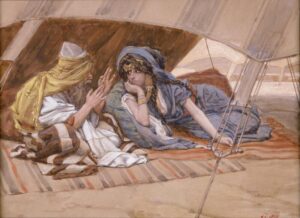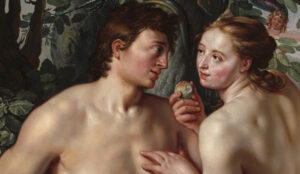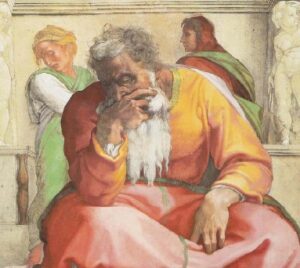Researched and prepared by Ruth Magnusson Davis
This post belongs to the series “Principal Matters from the 1537 Matthew Bible.” The purpose of the series is:
(1) To get to know the Table of Principal Matters in the Matthew Bible.
(2) To learn through bible studies from the Reformation.
“As the bees diligently do gather together sweet flowers, to make by natural craft the sweet honey, so have I done with the principal topics contained in the bible.”
So began John Rogers’ introduction to the Table of Principal Matters in the 1537 Matthew Bible. This Table was a concordance set at the front of the book which set out bible topics in alphabetical order. Under each topic were short headings with bible verses for further study. This Principal Matters Series follows the topics in the order of the Table. It also sets out the bible verses in full, taken from the Matthew Bible.
Topic: Angels, continued
In Part 1 of Angels, we saw that the angels assist before God, minister to people, rebuke sinners, and comfort the afflicted. This part 2 now concludes the topic:
(5) Angels teach things unknown. There is the example of the angel that taught Elijah what he should say to the servants of Ahaziah:
2 Kings 1:3-4 The angel of the Lord spoke to Elijah the Tishbite: Up, and go to meet the messengers of the king of Samaria and say to them, Is it because there is no God in Israel that you go to ask through Beelzebub, the god of Ekron?
Also the example of Daniel:
Daniel 9:21-23 While I was yet speaking in my prayer, behold, the man Gabriel, whom I had seen before in the vision, came flying to me and touched me, at about the offering-time of the evening. He informed me and spoke to me: O Daniel, said he, I have now come to make you understand it. For as soon as you began to make your prayer, it was so devised; and therefore I have come to show you. And why? Because you are a man greatly beloved. Therefore, ponder the matter well, so that you may learn to understand the vision … [etc]
Also of Joseph:
Matthew 1:20 While he thought on these things, behold, the angel of the Lord appeared to him in a dream, saying, Joseph son of David, fear not to take unto you Mary your wife. For that which is conceived in her is of the Holy Spirit.
Matthew 2:13 When they had departed, behold, the angel of the Lord appeared to Joseph in a dream, saying, Arise, and take the child and his mother, and flee into Egypt, and remain there till I bring you word. For Herod will seek the child to kill him.
Also of Cornelius:
Acts 10:3-6 The same man saw in a vision clearly, about the ninth hour of the day, an angel of God coming in to him and saying to him, Cornelius! When he looked on him, he was afraid, and said, What is it, Lord? He said to him, Your prayers and your alms have come up into remembrance before God. And now, send men to Joppa, and call for one Simon, named also Peter. He lodges with one Simon a tanner, whose house is by the seaside.
Also of Zacharias:
Luke 1:11-13 And there appeared to him an angel of the Lord standing on the right side of the altar of incense. And when Zacharias saw him, he was startled, and fear came on him. And the angel said to him, Fear not, Zacharias, for your prayer is heard. And your wife Elizabeth will bear you a son, and you shall call his name John. [etc]
Also of Mary:
Luke 1:26-31 In the sixth month, the angel Gabriel was sent from God to a city of Galilee named Nazareth, to a virgin espoused to a man whose name was Joseph, of the house of David. And the virgin’s name was Mary. And the angel went in to her and said, Hail, thou full of grace! The Lord is with you. Blessed are you among women. When she saw him, she was bewildered at his words, and cast in her mind what manner of salutation this could be. And the angel said to her, Fear not, Mary, for you have found grace with God. Lo, you shall conceive in your womb, and shall bear a son, and shall call his name Jesus.
(6) By the angels, God scourges people.
2 Samuel 24:15-16 For the Lord sent a pestilence in Israel from the morning to the end of the time appointed. And 70,000 of the people between Dan and Beersheba died. And when the angel stretched out his hand against Jerusalem to have destroyed it, the Lord had grief about doing that harm, and said to the angel that was destroying the people, It is sufficient; let your hand cease.
2 Kings 19:35 And the very same night the angel of the Lord went out and smote in the camp of the Assyrians 185,000 men. And when they were up early in the morning, behold, they were all dead corpses.
Acts 12:21-23 And upon a day appointed, Herod arrayed himself in royal apparel, and sat in his seat and made a speech to them. And the people gave a shout, saying, It is the voice of a god, and not of a man! And immediately the angel of the Lord struck him down, because he did not give God the honour. And he was eaten by worms and gave up the spirit.
The angel speaks to Joseph. An engraving by A. A. Morel.
~~End~~
Notices:
– New Testament Scriptures are from the October Testament, the New Testament of the New Matthew Bible. Old Testament Scriptures and Apocryphal writings are taken directly from the Matthew Bible, with obsolete English gently updated, roughly as they will appear in the complete New Matthew Bible.
– Click here for information about the New Matthew Bible Project, our project to gently update the 1537 Matthew Bible.
– Sample scriptures from the New Matthew Bible are here.
– To find former topics, go to the main blog page, and under the category “Principal Matters Series” look for the subcategory with the right letter. For example, for “Abrogation,” look under Principal Matters Series/Principal Matters A/Abrogation. (Also, a few topics are linked at the end.)
– See Angels Part 1 here

